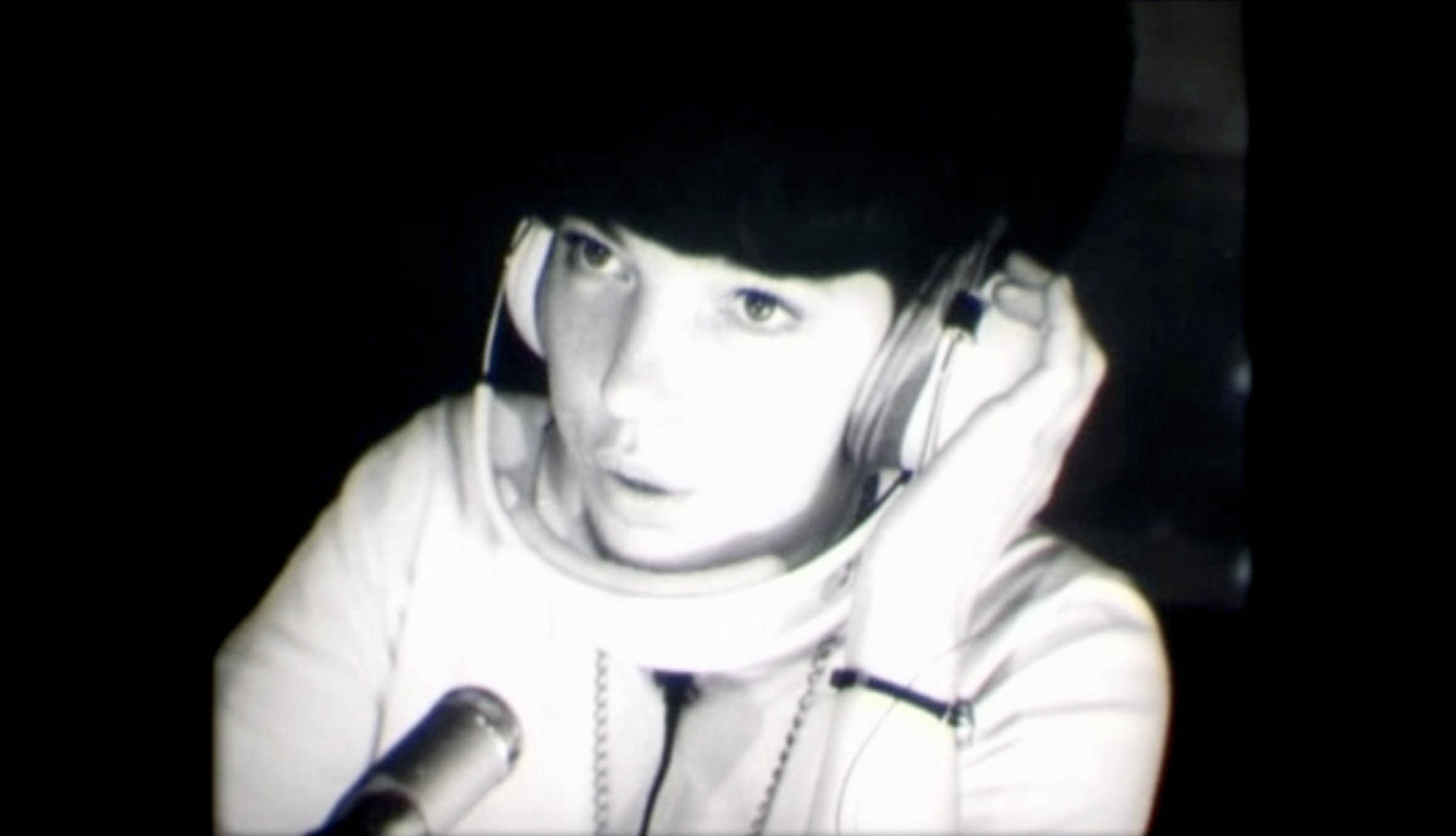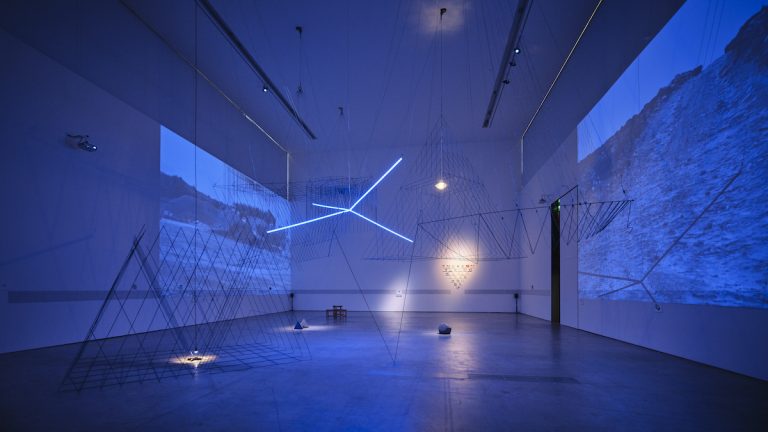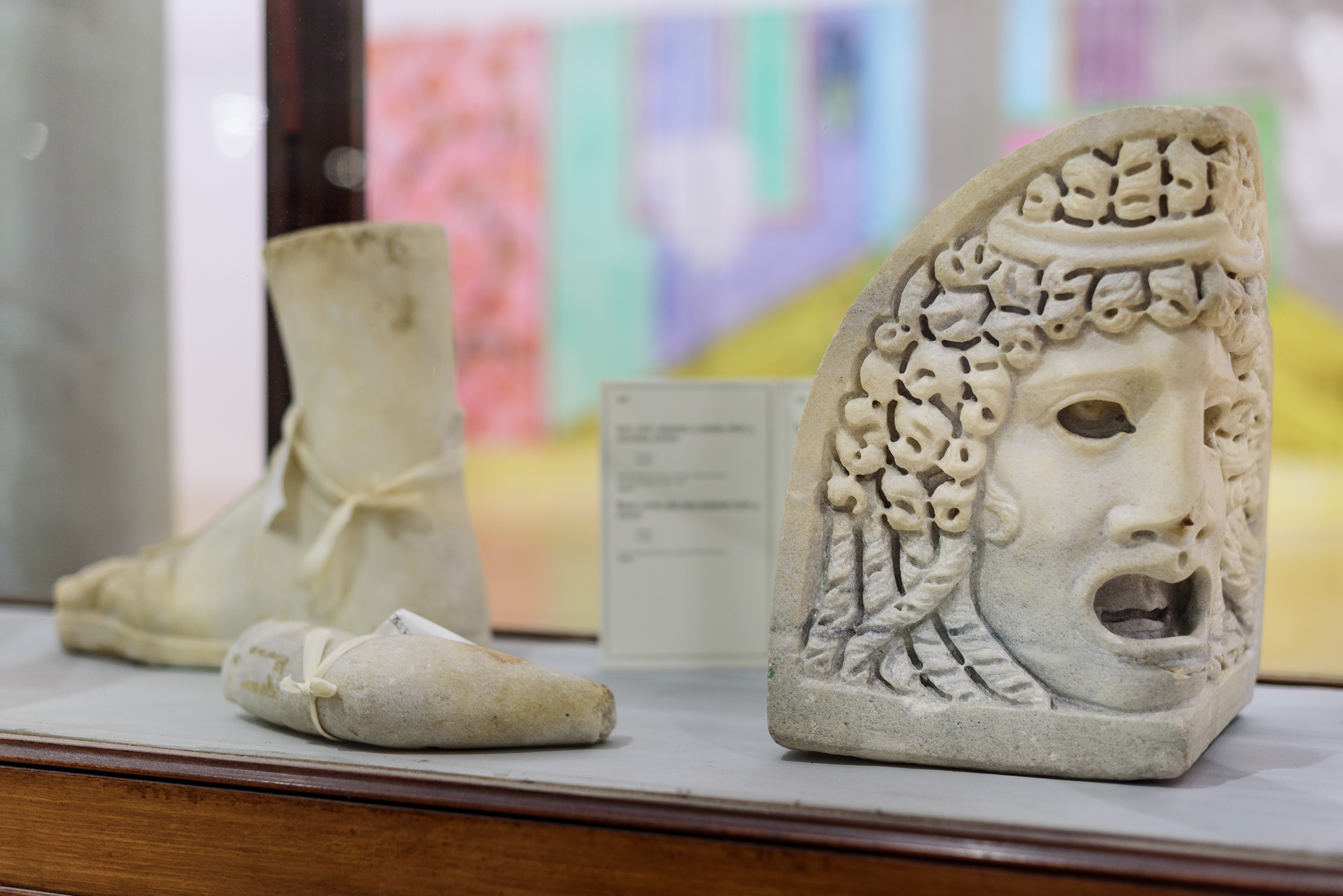Phil Collins’ 35 minute documentary-style video installation is a counter-narrative to the overwhelming winner/loser discourse surrounding communism, the Cold War and the free market that grew after the fall of the Berlin Wall in 1989, and the subsequent collapse of the world communist order in the 1990s.
This film is part of a 15-artist group show called Revolution vs. Revolution, that has run at the Beirut Arts Center from February 2 to April 30, 2012. Taking the revolutions and uprisings that have happened across the Arab world over the past 16 months as a jumping off point, the show is a re-examination of some of the world’s most significant recent revolutions including the Iranian Revolution in 1979, the Soviet Revolution of 1917, the Chinese Cultural Revolution, the fall of apartheid in South Africa, the fall of Communism in the former USSR, the student riots of 1968 across the world, the Communist Revolution in Poland, and the Nicaraguan revolution in 1979.
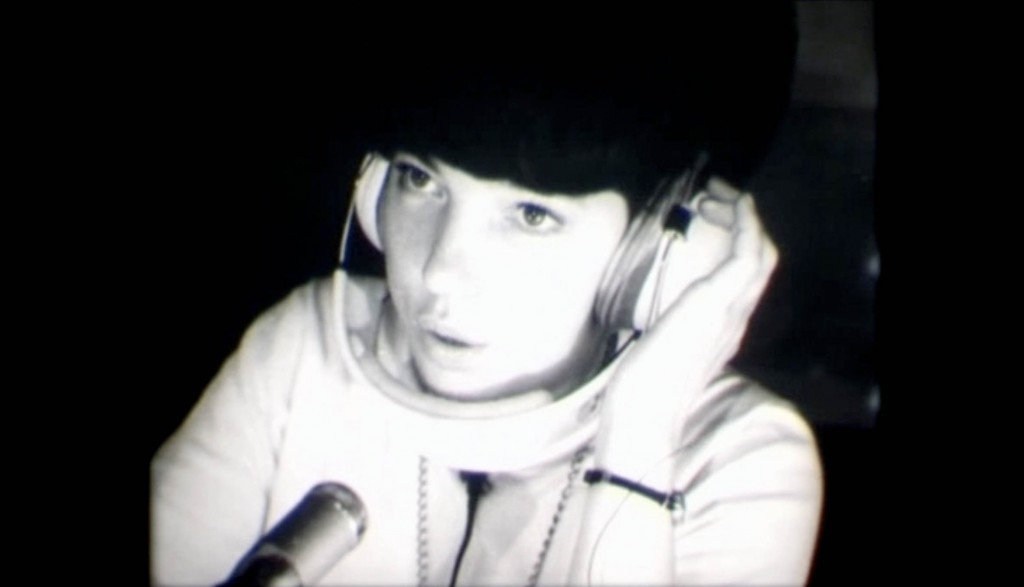
Phil Collins: marxism today (prologue)
2010
HD video, 35 min
Courtesy Shady Lane Productions and Kerlin Gallery, Dublin.
Artists in the show include: Abbas (Iranian), Vyacheslav Akhunov (Kyrgyz), Francis Alÿs (Belgian), Hai Bo (Chinese), Steven Cohen (South African), Tacita Dean (English), Fadi el Abdallah (Lebanese), David Goldblatt (South African), Alfredo Jaar (Chilean), William Kentridge (South African), Marysia Lewandowska (Polish), Neil Cummings (Welsh), Susan Meiselas (American), and Boris Mikhailov (Ukranian).
In marxism today (prologue), Collins explores the thoughts, memories and current positions of three former GDR (German Democratic Republic) women who were teachers of “Marxism-Leninism,” a subject that was compulsory in communist East Germany, before the fall of the political system there. Once East and West Germany were reunified, these teachers found themselves obsolete and jobless and were obliged to retrain in other professions suitable to the new free market order that engulfed their country. One of them became a social worker, another a businesswoman in West Germany, and the third started a dating service for academics.
Through a mixture of archival news footage, East German propaganda material, and the personal effects of these women (photographs, diaries, class notes), Collins’ film looks at what was lost with the fall of communism and what for some, is still longed for, some twenty years after that most crucial shift in 20th century world politics.
Today, where the global recession has brought the modern capitalist, free market system under considerable question, Collins’ film is a subtle questioning of that system and the exponential political gains it made globally after the fall of communism in East Germany, the Eastern Bloc, and the former USSR.
“I didn’t learn anything new there about how to serve the people better, but I did learn how to get rich,” Andrea Faber says of her transition, post-1989, from Marxist-Leninist professor in East Germany to businesswomen in West Germany. “Now my life is about consuming and making money. It’s quite poor.”
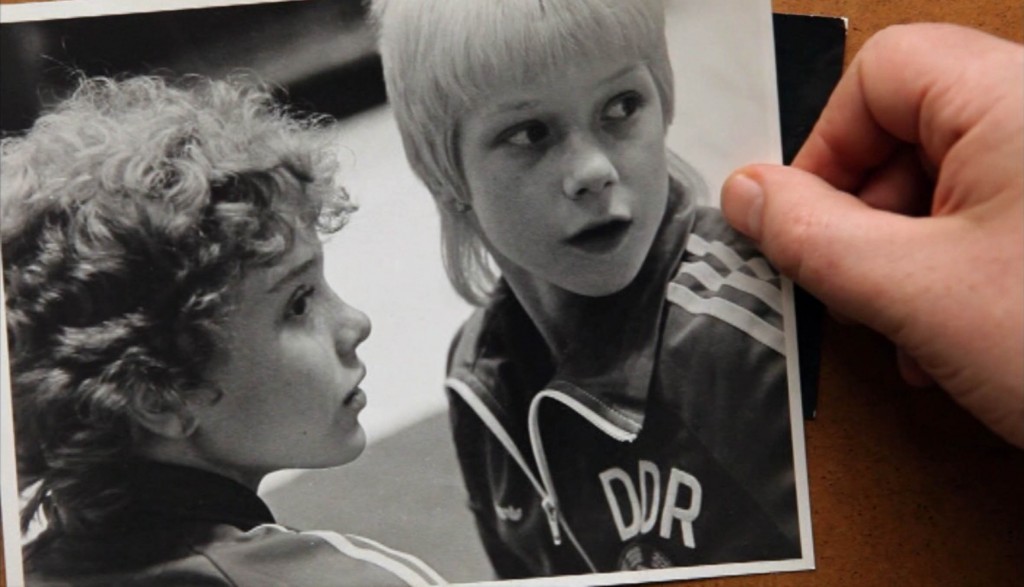
Phil Collins: marxism today (prologue)
2010
HD video, 35 min
Courtesy Shady Lane Productions and Kerlin Gallery, Dublin.
Collins interviews his subjects at their homes or at their places of work. Some of the interviews occur with small, unexplained audiences of (perhaps) friends or colleagues, who nod or react facially but never interject vocally. He intercuts the women’s thoughts with a variety of original material, including entire scenes from East German state propaganda films denigrating West German capitalism and lauding the East German way. One such scene, in a classroom, shows a teacher writing the word EXPLOITATION? on the blackboard, saying that while it is an outdated concept in East Germany, “Do the students think it exists in West Germany?” He urges the students to speak freely and what follows is a montage of young, halting criticisms, of varying degrees, of Western consumerism, its dangerous charms, and ultimately, the atrophy it brings to the individual and to society.
The use of such blatant propaganda material, and the echoes it makes with the contemporary thoughts of Collins’ interviewees, makes the piece a far more nuanced work – it is a re-examination, with the benefit of two decades of hindsight, of a crucial period of political and ideological tumult, rather than an indictment of one political system over the other.
In marxism today (prologue), it is understood that East German communism was flawed, and this is carried through Collins’ use of archival material and through some of the individual anecdotes of the film’s three main subjects (one of the women had an African fiancé who was denied a visa renewal to stay and he gassed himself, another bemoans the intense pressure at school it put on young people). The focus is therefore on the “baby” that was thrown out with the proverbial bathwater after the fall of communism: a mixture of personal nostalgia and solid arguments for certain political and economic precepts that disappeared in united Germany and which are, these women feel, sorely lacking today.
The women of marxism today (prologue) are describing and mourning what has become an imagined homeland, ideas and memories that have become more accessible since the heady, belligerent, divisive Cold War discourse has subsided, and western security preoccupations shifted elsewhere.
“I would have adapted mentally, much quicker,” says Faber of her move to West Germany, “if the West Germans had let me. But they were so keen on letting us know that our whole existence had been a mistake, and we had to constantly say sorry for being East German and for having lived under that system.”
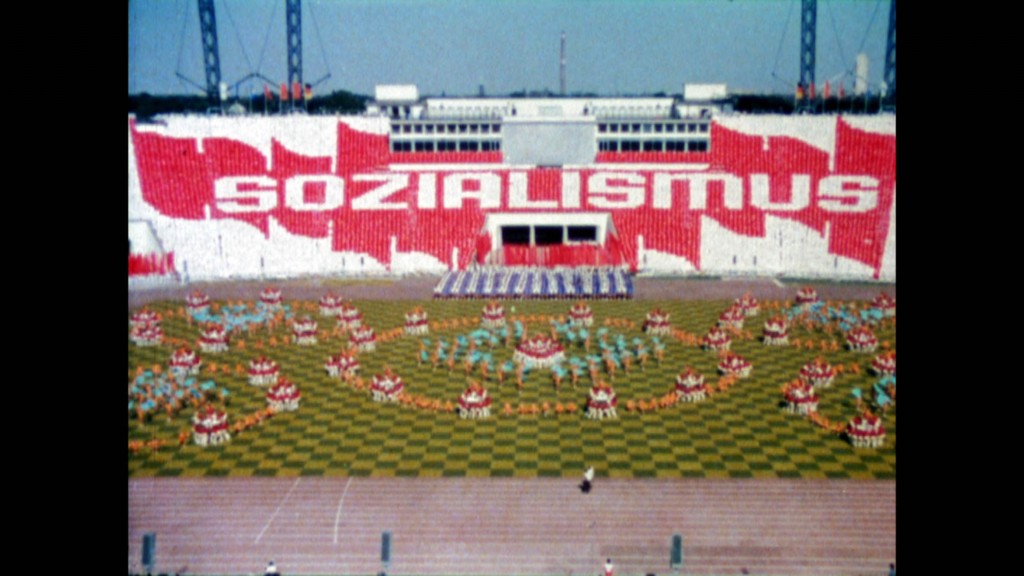
Phil Collins: marxism today (prologue)
2010
HD video, 35 min
Courtesy Shady Lane Productions and Kerlin Gallery, Dublin.
The theme of revolutions is not only pertinent in an Arab city like Beirut at this time when the region is undergoing such radical political change and contention. Collins’ film about the special and political division and problematic reunification of a place is particularly relevant in Beirut, a city that was physically, politically and religiously divided during the Lebanese civil war from 1975 – 1990. Much like the subjects in Collins’ film, many Lebanese and Beirutis question the problematic status quo and peace consensus that has settled over the scarred city since the conflict ended.
marxism today (prologue) is also a meditation on the camera, the lens, and how it has served, severally, as an agent for emancipation, for disinformation, for exploitation, and for documentation on both sides of the East/West German propaganda war.
One of the more poignant sequences of archival material used by Collins is in connection with Ulrike Klotz, the daughter of Marianne Klotz, one of the film’s three main subjects, who was one of East Germany’s star gymnasts, and who competed at the Seoul Olympics in 1988. Slowed down and looped footage of her performing on the vault or the high bar in Seoul, sometimes momentarily losing balance, is intercut with her account of her grueling schedule as a teenaged gymnast in a country for whom success in international sports competition was a crucial facet of its international propaganda.
Over a sequence of shots of a group choreographed dance in an East German sports stadium with the word “Sozialismus” emblazoned across the seating behind, Klotz explains how, by 1989, her spine was beginning to suffer and she had to quit gymnastics just as communism was falling. All of a sudden, much like her mother, the Marxism-Leninism professor (and the other women in Collins’ piece), her role and the society it fit into abruptly disappeared.
“I was suddenly in a body I didn’t really know,” she says.
Don Duncan is a journalist and filmmaker based in Beirut.

